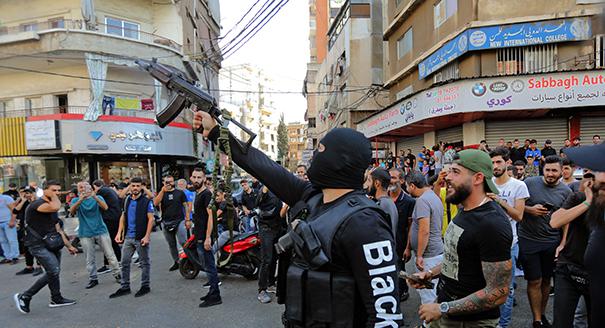“Those who are innocent don’t fear the judiciary,” Lebanese President Michel Aoun tweeted on November 10, in reference to Hezbollah’s campaign to stop the investigation of judge Tareq Bitar, who for months has been trying to uncover responsibilities in the devastating Beirut Port explosion of August 4, 2020. Given Aoun’s fifteen-year alliance with Hezbollah, such public criticism of the organization from the president is unprecedented.
However, Aoun is not alone. His comments reflect a wider trend of disenchantment with Hezbollah among Lebanon’s political class, as the party has imposed a parallel authority in the running of the state, preventing cabinet sessions until Bitar is removed from his post. Hezbollah has also supported the refusal of Information Minister George Qordahi to resign. Qordahi’s remarks critical of the Saudi-led war in Yemen and in defense of Ansar Allah have created a diplomatic crisis between Lebanon and the Gulf states, and the only way to begin improving ties, by most accounts, is that Qordahi step down.
A day before Aoun’s tweet, the Druze leader Walid Joumblatt declared that his patience with Hezbollah’s politics had run out. He criticized the party’s role in the dispute with Saudi Arabia and its allies, saying it threatened the livelihood of hundreds of thousands of Lebanese living and working in the Gulf. Sectarian leaders like Joumblatt, and to a certain extent Hezbollah allies such as Michel Aoun and the Shia speaker of parliament, Nabih Berri, would like to see Prime Minister Najib Mikati’s government restore some economic stability and negotiate a way forward with the International Monetary Fund. This would enable them to contain public discontent ahead of parliamentary elections scheduled for March 2022. For Joumblatt, who is preparing his son’s succession, this is a highly sensitive matter.
Mikati and his government, which was formed last September, have been on the defensive in recent weeks as Hezbollah and its allies have created one crisis after the other. The prime minister’s tenure began with Hezbollah’s controversial decision to import Iranian fuel, which could have brought U.S. sanctions. The party’s response to the Bitar investigation and the crisis with the Gulf states have only made matters worse. Hezbollah’s primary focus now is to sideline Bitar and derail his investigation. The question is why has the party taken such an aggressive position, and placed itself at the center of the controversy over the investigation, when it could have hidden behind its allies to undermine Bitar? This is all the more surprising as Bitar has not accused Hezbollah or any of its members of involvement.
The Qordahi affair has also been puzzling. By insisting that the minister remain at his post, Hezbollah has prevented the government from containing the rift with the Gulf states. If no resolution is found, and Saudi Arabia and its Gulf partners continue to escalate, it is conceivable that Mikati may choosee to resign, which would throw Lebanon into a profound political and security crisis. Why would Hezbollah risk its political capital by bringing about such an outcome at a critical juncture for the country?
Since the October 2019 protests, Hezbollah Secretary General Hassan Nasrallah has become a defender of the political status quo. Following the assassination of former prime minister Rafiq al-Hariri in 2005, and the withdrawal of Syrian forces from the country, Hezbollah sought to ensure that the political order would not harm the party’s interests. The elections of 2005 and 2009 brought anti-Hezbollah majorities to parliament, though they failed to curtail the party’s power. In the elections of 2018, Hezbollah was able to reverse the situation, winning a majority with its allies.
Elie al-Firzli, a key pro-Syrian figure, reflected the new majority’s mood by declaring, “I feel a historical mistake was corrected.” With an ally in the presidency and a parliamentary majority, Hezbollah thought this would help redefine Lebanon’s relations with Damascus through stronger economic and political ties. When this plan stalled, the party viewed the protests in 2019 as “a coup against the 2018 elections.” According to Hezbollah’s narrative, the U.S. Embassy in Beirut and its political allies orchestrated the protests to achieve political goals, including weakening Hezbollah.
The United States, a number of European states, and many in the international community support holding the forthcoming elections on time. So far, Hezbollah has not objected to this, although the party may lose its majority, given that Aoun is expected to shed seats in Christian-majority constituencies. Moreover, the anti-elite mood in the country, amid the worst economic crisis in Lebanon’s history, could bring new anti-Hezbollah figures to parliament, rolling back years of the party’s collusion with traditional politicians. This represents much uncertainty for Hezbollah, particularly after it intervened in the Syrian conflict precisely to avoid the emergence of a regional environment that could threaten its interests and Iran’s.
However, postponing the elections is not yet on the table. If Hezbollah or its allies decide to do so, the United States could impose sanctions on those involved in the decision. This may deter parliamentary blocs from going along with a postponement, at least publicly. That is why Hezbollah may have opted for an alternative strategy, which involves creating snowballing crises, paralyzing the government, deepening economic pain, and exacerbating political polarization, all of which would make elections nearly impossible.
Indeed, the recent elections in Iraq may represent a cautionary tale for Hezbollah. There, Iran’s allies lost seats, something that Nasrallah certainly does not want to replicate in Lebanon. That could well push Hezbollah to ensure that the country takes a rain check on its democratic process, or what’s left of it, come March of next year.








